Greek elections: Main parties from Syriza to Golden Dawn explained
- Published
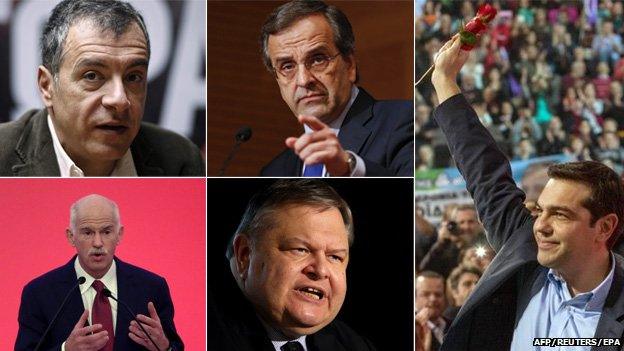
Alexis Tsipras is now Greece's new prime minister, following the victory of his left-wing Syriza party in Sunday's election.
Syriza, which has formed a coalition with the right-wing Independent Greeks party, has promised to end austerity, reverse budget cuts and boost wages.
Here is a look at Greece's main political parties who were vying for seats in parliament.

Syriza
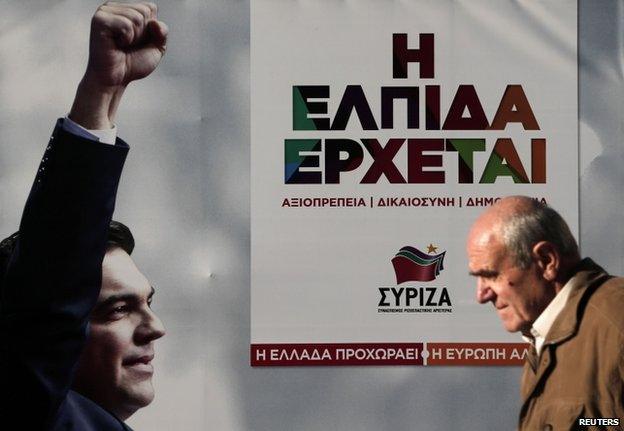
Syriza's banner reads: "Hope is on its way"
Syriza is an acronym meaning the "Radical Coalition of the Left". Formed in 2004, it is an umbrella group, with the party Synaspismos (Coalition of the Left of Movements and Ecology) the key component.
Mr Tsipras, its 40-year-old leader, originated from the youth wing of the Greek Communist Party, the KKE, and rose to prominence as candidate for the mayor of Athens in 2006.
Young people began to identify with Syriza after the riots in Greece in 2008. But it has since succeeded in attracting voters from a broad base, including public sector workers and small business owners.
Mr Tsipras's message to voters is simple - the promise of an end to painful austerity measures and a boost in public spending. The party's proposed policies include free electricity for people whose supplies have been cut off and food stamps handed out at schools.
Syriza has moderated its stance since the peak of the eurozone crisis, and says it wants Greece to stay in the euro.
But it has called for a possible debt write-off and wants to renegotiate Greece's bailout agreement with the EU and the International Monetary Fund.
This would set it on a collision course with the country's international lenders. Critics say what Syriza is advocating may mean Greece being forced leave the eurozone whether it wants to or not.

Independent Greeks
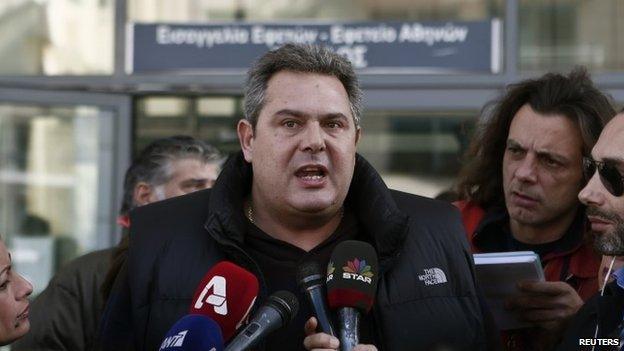
Independent Greeks leader, Panos Kammenos
The Independent Greeks, a right-wing, anti-bailout party, formed as a New Democracy splinter in 2012. It is led by Panos Kammenos.
It shares little ideological ground with Syriza, but its anti-austerity stance led to a coalition agreement with the party after the January 2015 elections.
Mr Kammenos has also described the country's creditors as "foreign conquerors".
His party appeals to those who feel their country's sovereignty has been eroded by the EU and the IMF.
In 2012, the position of the Independent Greeks was hinted at by Terens Kiwk, a Greek television personality turned party spokesman.
He said that the country was "under an occupation of loan sharks and under the command of Germany".
Mr Kammenos himself is a social conservative who has called for less immigration in the past.
Meanwhile his party is close to the Orthodox Church and takes a hard line against neighbouring Turkey, Macedonia and Albania, reports the AFP news agency.

New Democracy
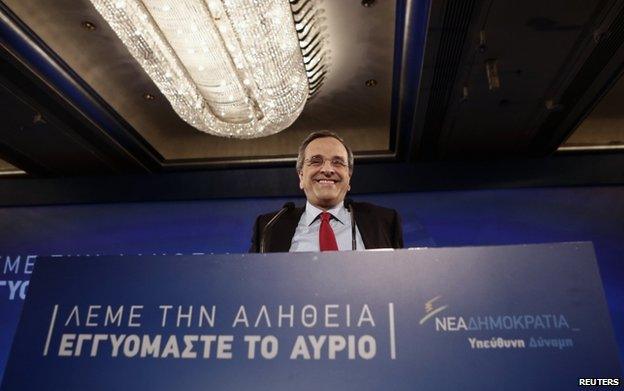
Antonis Samaras has been prime minister since 2012
Outgoing Prime Minister Antonis Samaras, leader of the conservative New Democracy party, was seen as Mr Tsipras's main rival.
He has headed a coalition government - with partners Pasok - which has been committed to keeping the country in the euro and pushing ahead with plans to secure EU-IMF bailout funds.
Mr Samaras's government has to a certain extent stabilised Greece's severe fiscal crisis by pushing through many of the austerity measures, despite substantial public opposition to spending cuts.
But the future of this course was thrown into doubt in the dying days of 2014, when parliament's failure to elect a president triggered a snap election.

The River (To Potami)
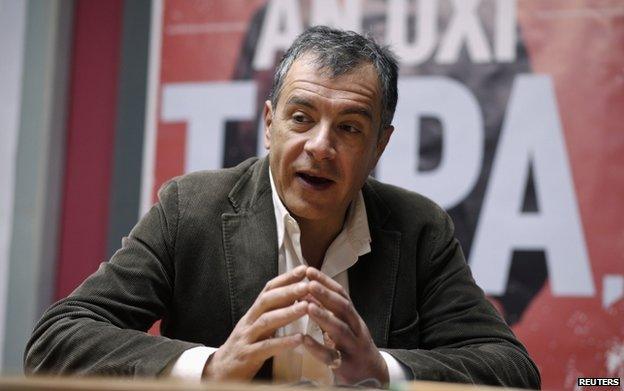
Stavros Theodorakis is a popular television journalist
The River (To Potami) is a moderate centre-left party formed in 2014 by Stavros Theodorakis, a 51-year-old television journalist.
It is firmly pro-European, and its leader said he was prepared to go into coalition with another party as long as it pledges to combat corruption and keep Greece firmly in the eurozone.
The party was polling in third place in the run-up to the election, and Mr Theodorakis was being widely regarded as "kingmaker-in-waiting"., external
"We want Potami to be the force that will pull the biggest party in the right direction and ensure we have neither far-right policies nor anti-European policies," Mr Theodorakis told Reuters news agency.
To Potami's fast rise has been attributed to public dissatisfaction with the country's economic woes and political establishment.
But the party urges moderation, saying Greece must meet its bailout commitments while reforming the public sector and political system as well as creating jobs.

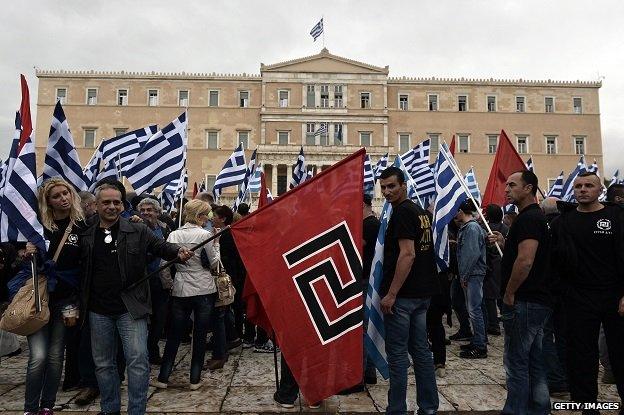
Members of Golden Dawn have been accused of perpetrating attacks on foreigners and political opponents
Feared by many as neo-Nazis, Golden Dawn nevertheless gained substantial support during the economic crisis.
In 2014, the far-right party gained the third highest share of the vote in the European Parliament elections in Greece, translating into three MEPs.
Violently anti-immigrant, its support has shrunk following the prosecution of its leadership.
Golden Dawn leader Nikos Michaloliakos and several other MPs are being held in custody after the murder of an anti-racist musician in September 2013.
Members have been accused of perpetrating attacks on foreigners and political opponents.
But the party had still been expected to do well in the January 2015 election, and ended up polling in third place and winning 17 seats.

Panhellenic Socialist Movement (Pasok)
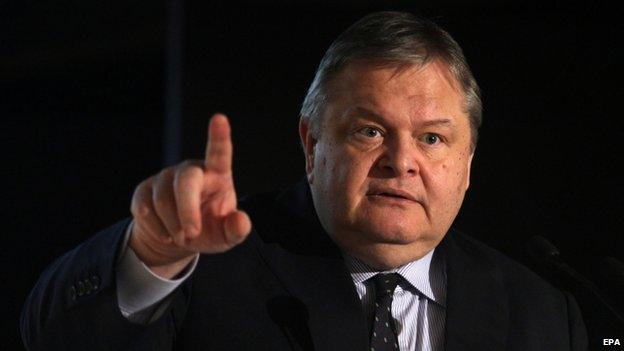
Evangelos Venizelos replaced George Papandreou as Pasok leader in 2011
The junior partner in the outgoing conservative-led two-party coalition is the Panhellenic Socialist Movement (Pasok), led by Evangelos Venizelos.
The centre-left party dominated Greek politics in the post-World War Two period and led Greece at the height of the eurozone crisis. But public anger at austerity measures saw Pasok haemorrhage support.
George Papandreou was forced to quit as prime minister in November 2011 amid the government debt crisis, and later resigned as Pasok leader.
He was replaced by Mr Venizelos, who is deputy prime minister and foreign minister in the outgoing government.
The party was considered another potential coalition partner in 2015. But Mr Venizelos said this depended on a commitment from Syriza or New Democracy to completing pending bailout negotiations and moving forward without any risky moves.
However Pasok suffered another setback when Mr Papandreou broke away to set up a rival party in early January.

Movement of Democratic Socialists (Kinima)
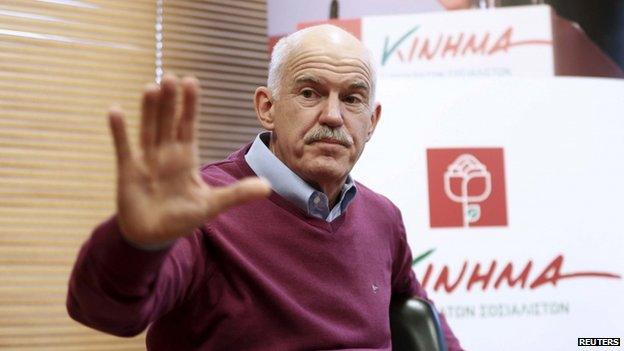
George Papandreou is the grandson of Andreas Papandreou, who dominated Greek politics for decades
Weeks before the election, ex-PM George Papandreou announced the formation of the Movement of Democratic Socialists (Kinima) to contest the election separately from his former party, Pasok.
Analysts say Kinima could win seats trading both on the Mr Papandreou's political brand and on promises of a "new era" in Greek politics.
He is the son of Pasok founder Andreas Papandreou, and grandson of one of Greece's most celebrated politicians, also Andreas Papandreou.

Greek Communist Party (KKE)
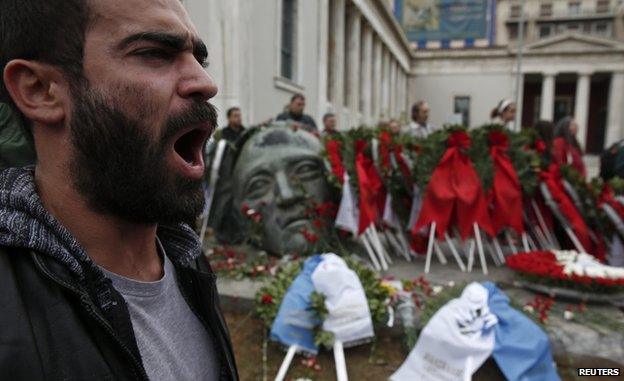
Greece's civil war ended in 1949 with the defeat of the Communist Party of Greece (KKE) and it was banned from politics until 1974.
It was legalised as Greece entered its post-dictatorship democracy - but by the late 1970s, the Greek left had broadly found its voice through the increasingly popular Socialist Pasok party.
Syriza has now supplanted Pasok as the dominant party of the left.
The KKE has also grown its vote in recent years, while holding on to its traditional demographic base - manual workers and lifelong Communists - and is expected to win parliamentary seats.
But it had rejected overtures from Syriza's leader Alexis Tsipras about the possibility of becoming coalition partners.
- Published20 January 2015

- Published30 December 2014
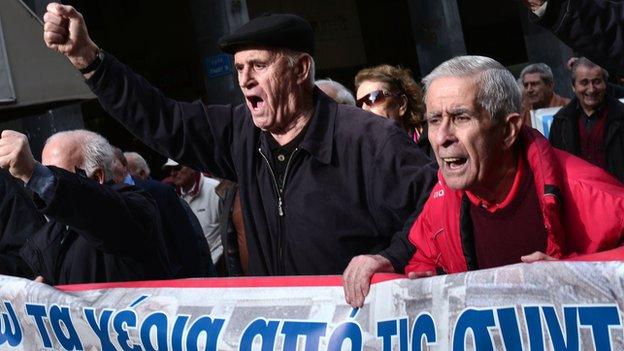
- Published5 January 2015